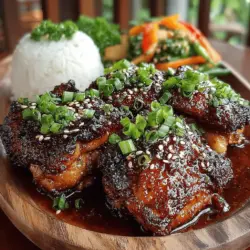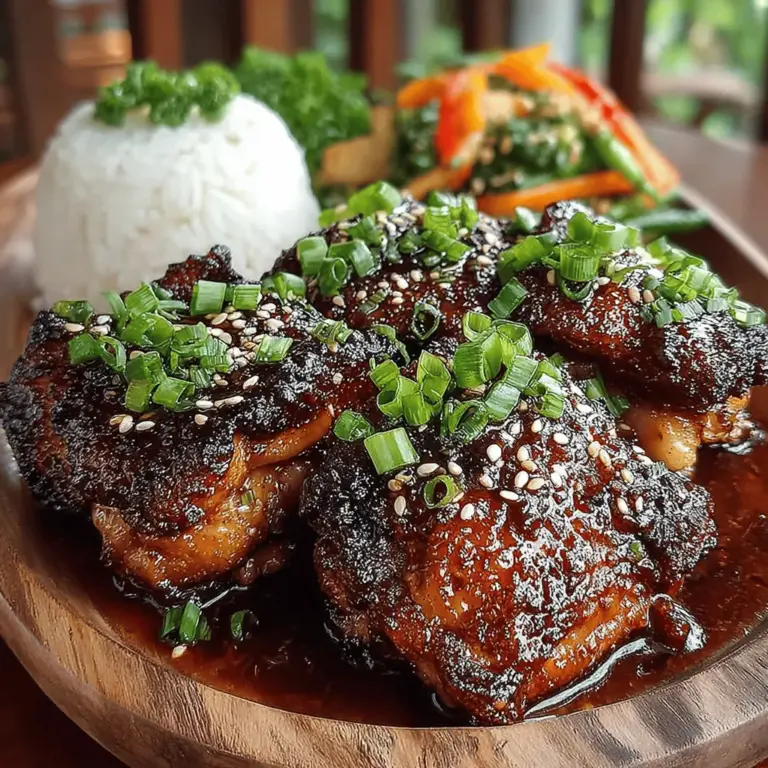Sticky Teriyaki Glazed Chicken Thighs: An Introduction to a Flavorful Delight
When it comes to comforting and delectable meals, few dishes can rival the allure of Sticky Teriyaki Glazed Chicken Thighs. This dish not only captivates with its glossy, caramelized exterior but also delivers a symphony of flavors that dance on the palate. The combination of sweet, savory, and umami notes makes teriyaki chicken a favorite among both home cooks and restaurant-goers alike. Whether served over a bed of fluffy rice, alongside vibrant vegetables, or simply enjoyed on its own, this dish is sure to please.
Teriyaki, a cooking technique that originated in Japan, marries the rich flavors of soy sauce with the sweetness of sugar, creating a glaze that is both irresistible and versatile. The method involves grilling or broiling meat that has been marinated or brushed with a sauce, resulting in a beautifully glazed finish that locks in moisture and flavor. This culinary tradition has become a staple in Japanese cuisine and has gained immense popularity worldwide, making it a go-to choice for quick weeknight dinners or impressive dinner parties.
One of the most appealing aspects of Sticky Teriyaki Glazed Chicken Thighs is the simplicity and speed of preparation. With just a handful of ingredients and minimal cooking time, this dish can be on the table in under an hour. The recipe is designed to be approachable for cooks of all skill levels, making it ideal for both seasoned chefs and kitchen novices. The ease of preparation, combined with its mouthwatering flavors, makes this dish a perfect candidate for any meal occasion.
Understanding Teriyaki Sauce
To truly appreciate Sticky Teriyaki Glazed Chicken Thighs, it’s essential to understand the teriyaki sauce that forms the backbone of this recipe. Teriyaki, which translates to “glaze broiled,” is a Japanese cooking technique that involves grilling or broiling food with a glaze made from soy sauce, sugar, and other ingredients. The origin of teriyaki can be traced back to the early 17th century in Japan, where it was used as a cooking method for fish and meat.
The foundation of teriyaki sauce lies in its key ingredients. Soy sauce serves as the primary source of saltiness, while brown sugar adds a layer of sweetness that balances the salty notes. The interplay of these two components is crucial, as it creates the signature flavor profile that teriyaki is known for. Additionally, ingredients such as rice vinegar and mirin enhance the sauce’s complexity, introducing a subtle tanginess that elevates the overall taste.
A defining characteristic of teriyaki sauce is its delightful balance of sweetness and umami. The sweetness not only contributes to the glaze’s glossy appearance but also helps caramelize the chicken during cooking, creating that coveted sticky texture. The umami from the soy sauce enriches the dish, making each bite satisfying and delicious.
Ingredients Breakdown
Now that we have an understanding of teriyaki sauce, let’s delve into the primary ingredients that make Sticky Teriyaki Glazed Chicken Thighs a standout dish.
Chicken Thighs: The choice of chicken thighs over breasts is intentional. Bone-in, skin-on chicken thighs provide a rich flavor and juiciness that is hard to beat. The fat rendered from the skin during cooking enhances the overall taste and helps keep the meat tender and moist.
Soy Sauce: Opting for a low-sodium soy sauce is recommended to maintain control over the saltiness of the dish. This allows for a more balanced flavor profile, especially when paired with the sweetness of brown sugar.
Brown Sugar: This ingredient is pivotal to achieving that sticky glaze we all crave. Its caramelization during cooking not only contributes sweetness but also adds depth to the flavor.
Rice Vinegar and Mirin: These ingredients serve to brighten the sauce, providing a hint of acidity that lifts the flavors. While mirin is a sweet rice wine, rice vinegar offers a milder tang, both enhancing the overall flavor profile of the teriyaki.
Garlic and Ginger: Aromatics like garlic and ginger are essential in building a robust flavor base. Their fragrant qualities complement the sweetness and umami of the teriyaki sauce, adding layers of complexity to the dish.
Cornstarch: This ingredient acts as a thickening agent, ensuring that the teriyaki sauce clings to the chicken thighs, creating that signature sticky texture. It helps achieve the perfect consistency for the glaze.
Garnishes: The finishing touches, such as sesame seeds and chopped green onions, add not only a pop of color but also additional textures and flavors that elevate the dish.
Preparation Steps Explained
Now that you are familiar with the ingredients, it’s time to explore the preparation steps for Sticky Teriyaki Glazed Chicken Thighs. The process begins with preparing the chicken, which is crucial for achieving the desired flavor and texture.
Preparing the Chicken: Start by patting the chicken thighs dry with paper towels. This step is vital as it removes excess moisture, allowing the skin to crisp up beautifully during cooking. If moisture remains, it can lead to steaming rather than searing, which is not ideal for achieving that coveted crispy skin.
Next, season the chicken thighs generously with salt and pepper. This seasoning is essential for enhancing the natural flavors of the chicken and ensuring that every bite is delicious. For those who prefer a stronger flavor, consider marinating the thighs in a portion of the teriyaki sauce for at least 30 minutes before cooking.
Searing Techniques: When it comes to cooking, searing the chicken thighs over high heat is key to achieving a crispy skin. A hot skillet or grill ensures that the skin renders the fat quickly, resulting in a beautifully browned exterior. Pay attention to visual cues: once the skin releases easily from the pan and develops a golden-brown color, it’s time to flip the chicken.
As the chicken sears, prepare the teriyaki sauce by combining soy sauce, brown sugar, rice vinegar, mirin, minced garlic, and grated ginger in a saucepan. Bring the mixture to a gentle simmer, allowing the flavors to meld together. The sugar will dissolve, creating a cohesive sauce that will coat the chicken.
To achieve the perfect glaze, mix a small amount of cornstarch with water to create a slurry. As the sauce simmers, gradually add this slurry to the mixture, stirring until it thickens to your desired consistency. This process not only enhances the sauce’s texture but also ensures it clings beautifully to the chicken thighs.
With these initial steps in place, you are well on your way to creating a dish that is not only flavorful but also visually appealing. Sticky Teriyaki Glazed Chicken Thighs are a testament to the harmonious blend of ingredients and techniques that define both Japanese cuisine and home cooking. Stay tuned as we dive deeper into the cooking process and unveil the finishing touches that make this dish truly unforgettable.
{{image_2}}
Thickening the Sauce
One of the crucial steps in creating the perfect sticky glaze for your teriyaki chicken is thickening the sauce. A well-thickened teriyaki sauce not only enhances the flavor but also ensures that it clings beautifully to the chicken, resulting in a more satisfying dish.
How Cornstarch Slurry Works to Create the Desired Consistency
To achieve that coveted glaze, a cornstarch slurry is often used. This method involves mixing equal parts of cornstarch and cold water to create a smooth paste. When added to the simmering sauce, the cornstarch activates and thickens the liquid as it heats. The key is to add the slurry gradually, stirring continuously to prevent clumps from forming. Once the sauce reaches your desired thickness, remove it from the heat to avoid overcooking the cornstarch, which can cause the sauce to become watery again.
Visual Indicators of Sauce Thickness
Knowing when your sauce is perfectly thickened can be determined by a few visual cues. A well-thickened teriyaki sauce should coat the back of a spoon and have a glossy appearance. When you run your finger through the sauce on the spoon, it should leave a clear trail. The sauce should also have a slow, steady drip when poured. If it’s too thin, simply continue to simmer for a couple more minutes before adding more cornstarch slurry if necessary.
Cooking the Chicken in Sauce
Once your sauce is thickened to perfection, it’s time to marry the chicken thighs with the sauce. This step is essential not only for flavor but also for ensuring that the chicken remains juicy and tender.
Importance of Simmering for Flavor Absorption
After placing the browned chicken thighs back into the pan with the teriyaki sauce, allow them to simmer over low heat. This simmering process allows the chicken to absorb the rich flavors of the sauce while also ensuring that it cooks through evenly. Depending on the size of your chicken thighs, simmering for about 10-15 minutes is usually sufficient.
Internal Temperature Guidelines for Safety
To ensure your chicken is safely cooked, it’s crucial to check the internal temperature. The USDA recommends that chicken thighs be cooked to an internal temperature of at least 165°F (75°C). Using a meat thermometer is the best way to accurately gauge doneness. Insert the thermometer into the thickest part of the chicken, avoiding the bone for an accurate reading.
Serving Suggestions
Now that your sticky teriyaki glazed chicken thighs are ready, let’s explore the best ways to serve this delectable dish.
Recommended Side Dishes That Complement the Chicken
Pairing your chicken with the right sides can elevate the entire meal experience. Here are a few suggestions:
– Steamed Rice: A staple in many Asian cuisines, steamed rice is the perfect base for soaking up the delicious teriyaki sauce. Jasmine rice or basmati rice are excellent choices due to their fragrant qualities, but you can also opt for sticky rice for a more traditional approach.
– Stir-Fried Vegetables: Colorful stir-fried vegetables add a vibrant touch to your plate. Quick stir-fries using bell peppers, broccoli, and snap peas can complement the savory flavors of the chicken. Simply sauté these vegetables in a little sesame oil and garlic for added flavor.
Plating Tips for an Appealing Presentation
Presentation is key when it comes to enticing your guests. Start with a mound of fluffy rice in the center of your plate, then arrange the teriyaki chicken thighs on top. Drizzle some extra sauce over the chicken for a glossy finish. Garnish with sesame seeds and finely chopped green onions for a pop of color. Adding a side of stir-fried vegetables will not only bring vibrant colors to your dish but also create a balanced meal.
Nutritional Information
Understanding the nutritional benefits of your meal can help you make informed choices.
Overview of Nutritional Benefits of the Primary Ingredients
The primary ingredients in this recipe—chicken thighs, soy sauce, ginger, and garlic—bring a wealth of nutrients to the table. Chicken thighs are rich in protein, which is essential for muscle repair and growth. They also provide important vitamins and minerals, including B vitamins, iron, and zinc. Soy sauce, while high in sodium, offers antioxidants and can enhance the overall flavor of your dish. Meanwhile, ginger and garlic are known for their anti-inflammatory properties and potential immune-boosting benefits.
Health Considerations and Modifications
For those with dietary restrictions, there are several modifications you can make to this recipe. To create a gluten-free version, simply swap out regular soy sauce for tamari or coconut aminos. You can also adjust the amount of sugar in the sauce to suit your taste or dietary needs, using alternatives like agave nectar or stevia if desired.
Cultural Significance of Teriyaki in Japanese Cuisine
Teriyaki isn’t just a cooking method; it holds cultural significance in Japanese cuisine that dates back centuries.
Historical Context of Teriyaki Cooking Methods
The term “teriyaki” derives from two Japanese words: “teri,” meaning glaze, and “yaki,” meaning to grill or broil. Traditionally, teriyaki was a cooking method used for fish and meats, where they were marinated in a mixture of soy sauce, mirin, and sugar before being grilled to perfection. This method enhanced the natural umami flavors of the ingredients while creating a beautiful, caramelized exterior.
Modern Adaptations and Variations of Teriyaki Dishes Globally
Today, teriyaki has transcended its traditional roots and has been embraced worldwide. Various adaptations have emerged, from teriyaki chicken burgers to teriyaki tofu bowls, showcasing the versatility of this beloved sauce. In many cultures, chefs experiment with different proteins and flavor profiles, blending local ingredients with the classic teriyaki base, making it a global favorite.
Variations on the Recipe
While this sticky teriyaki glazed chicken thighs recipe is a classic, there are many ways to customize it to suit different tastes and preferences.
Exploring Alternative Proteins
If you’re looking to switch things up, consider using alternative proteins such as tofu or fish. Tofu can be marinated in the same teriyaki sauce and then grilled or pan-fried for a delicious vegetarian option. Salmon is another fantastic choice that pairs well with the flavors of teriyaki, providing a rich and satisfying meal.
Adjusting Sweetness and Savory Levels
Feel free to experiment with the balance of sweetness and savory in your sauce. If you prefer a sweeter glaze, add a bit more sugar or honey. For a saltier kick, increase the amount of soy sauce or add a splash of fish sauce for depth.
Regional Variations in Teriyaki Preparations
In different regions, teriyaki preparations can vary significantly. In Hawaii, for example, teriyaki sauce is often used as a marinade for grilled meats and is served with rice and macaroni salad. On the other hand, in the United States, teriyaki has evolved into a popular fast-food item, often found in stir-fries and as a topping on rice bowls.
Tips for Cooking Perfect Sticky Teriyaki Chicken
To ensure your sticky teriyaki chicken turns out perfectly every time, consider these helpful tips.
Common Mistakes to Avoid
One common mistake is cooking the chicken at too high of a heat, which can lead to uneven cooking and dryness. Always opt for medium heat when browning your chicken to achieve a nice sear without overcooking.
How to Achieve the Perfect Glaze
To get that perfect sticky glaze, make sure to baste the chicken with the sauce as it simmers. This helps to develop layers of flavor and creates a deliciously sticky exterior.
Storage Tips for Leftovers
If you have leftovers, store them in an airtight container in the refrigerator for up to three days. To reheat, place the chicken in a skillet over medium heat, adding a splash of water to prevent it from drying out. For longer storage, consider freezing the chicken without the sauce for up to three months.
Conclusion
Sticky teriyaki glazed chicken thighs are a delightful addition to any dinner table, combining rich flavors with simple preparation. With this recipe, you’ll discover how easy it is to create a restaurant-quality dish at home. The balance of sweet and savory, along with the satisfying glaze, makes this chicken a sure crowd-pleaser.
As you experiment with this teriyaki recipe, don’t hesitate to incorporate your favorite flavors or techniques. The beauty of teriyaki lies in its versatility, allowing you to explore various ingredients and adapt the dish to your liking. Embrace the homemade teriyaki experience, and enjoy the satisfaction of creating a delicious meal that pays homage to Japanese culinary traditions.



